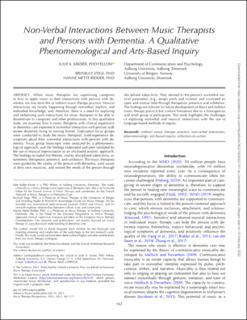| dc.description.abstract | When music therapists are supervising caregivers in how to apply music in their interactions with persons with dementia, we may term this as indirect music therapy practice. Musical interactions are mostly happening through nonverbal, implicit, and embodied knowledge, and, therefore, there is a need for exploring and verbalizing such interactions for music therapists to be able to disseminate to caregivers and other professionals. In this qualitative study, we examine how 6 music therapists with clinical experience in dementia care experience nonverbal interaction with persons with severe dementia living in nursing homes. Explorative focus groups were conducted to study the music therapists’ lived-experience descriptions about their nonverbal interactions with persons with dementia. Focus group transcripts were analyzed by a phenomenological approach, and the findings elaborated and peer validated by the use of musical improvisation as an arts-based analytic approach. The findings included five themes: vitality, disciplined subjectivity, attunement, therapeutic presence, and validation. The music therapists were guided by the vitality of the person with dementia, were aware of their own reactions, and sensed the needs of the person through disciplined subjectivity. They attuned to the person’s nonverbal musical parameters (e.g., tempo pitch and volume) and cocreated an open and mutual field through therapeutic presence and validation. The findings are relevant for future development of direct and indirect music therapy practice but contain limitations due to a homogenous and small group of participants. This study highlights the challenges of exploring nonverbal and musical interactions with the use of language-based methods of inquiry. | en_US |

